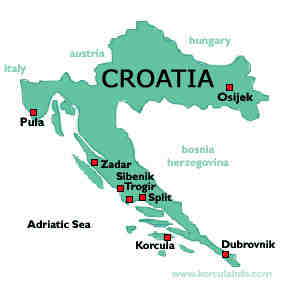Foreign tourism investors face tough slog in Croatia
 Split - Foreign investors brought the know-how to Croatia's attractive coast to help transform and prod its crucial tourism industry forward, but often felt they had to battle too many obstacles to do business.
Split - Foreign investors brought the know-how to Croatia's attractive coast to help transform and prod its crucial tourism industry forward, but often felt they had to battle too many obstacles to do business.
The prominent Austrian hotelier Wilfried Holleis packed his bags and sold his project to convert a decrepit resort on the island Katarina into a luxury holiday destination.
Holleis said he wasted years trying to obtain the promised permits to renovate, while fighting murky legal battles and warding off his junior Croatian partner's backstabbing.
Another major investor, the co-owner of the Austrian Valamar Group Georg Eltz, accused Croatian businessmen and local politicians of playing a crooked game.
"They keep us only for milking purposes," says Eltz. "They cavort with politicians to keep foreigners out and the business to themselves."
Foreign hotel operators were a key ingredient in the rapidly taking the Croatian tourist industry out of the doldrums over the last 10 years.
Tourism is now the country's largest revenue-generator, raking in some 7 billion euros, or roughly one-fifth of the gross domestic product in 2008, though the financial crisis is expected to slash earnings by no less than 10 per cent this year.
Though they have been good to Croatia, foreign hotel operators have complained that Croatia has not been good to them. Recently they met on Island Bol to compare notes.
Among other things, they are forced to buy food and beverages from Croatian monopolists, at a price one-quarter higher than what one would pay for instance in Germany.
"Out guests just can't understand why it's so expensive to eat and drink here," said a representative of Gruber-Reisen, which operates a hotel on the Adriatic.
The red tape, legal and quasi-legal hurdles are even worse, because they often create obstacles on what the investor thought was a clear road to a business.
The Falkensteiner-Michaeler Group, another Austrian tourism concern, says it had to dodge a hail of problems hurled at it apparently to keep it from opening one of the early Western-standard, four-star hotels at Borik near the port of Zadar.
By Croatian standards, Punta Scala resort project on the peninsula of the same name is a huge project - a resort including an ultra- modern, self-sustainable, ecological luxury hotel, a family hotel and an apartment bloc.
The friction involved in the plans was unbelievable, says the company chief executive Otmar Michaeler.
The lot of land actually had to be purchased twice, at a total cost of 25 million euros (34.7 million dollars) and an additional 10 million euros were required for infrastructure, though none of it - road, water and power lines - existed.
The perpetually changing rules are doing everything possible to hamper the sale of the 187 apartments - which is the backbone of the whole project - waiting for the final touches and buyers.
"This way, our 210-million euro investment will not repay itself in 50 years," says Michaeler.
Meanwhile, taking advantage of the foundations laid by the Austrians, a Croatian-owned apartment bloc sprung up in the immediate neighbourhood and quickly went on sale. (dpa)